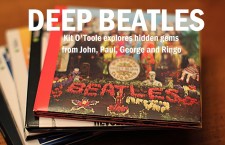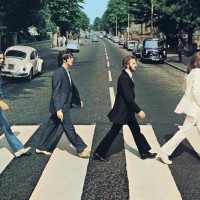One of the most tender and moving sections of the Beatles’ Abbey Road medley, “Golden Slumbers” features Paul McCartney at his best. His gift for melody, along with his clear vocals and skilled piano, shines in this modern adaptation of a very old lullaby.
The lyrics’ origins date back long before the Beatles. In 1603, English dramatist Thomas Dekker, along with coauthors Henry Chettle and William Haughton, published a play entitled Patient Grissel, loosely based on the character Griselda from Geoffrey Chaucer’s Canterbury Tales (specifically “The Clerk’s Tale”). Translated into modern English, the original poem reads as follows:
Golden slumbers kiss your eyes,
Smiles awake you when you rise;
Sleep, pretty wantons, do not cry,
And I will sing a lullaby,
Rock them, rock them, lullaby.Care is heavy, therefore sleep you,
You are care, and care must keep you;
Sleep, pretty wantons, do not cry,
And I will sing a lullaby,
Rock them, rock them, lullaby.
The clip below shows a version of the original tune:
As McCartney later recalled, he had visited his father’s Liverpool home and noticed sheet music on his piano. Stepsister Ruth had left her songbook on the stand; curious, McCartney leafed through it and stumbled upon Dekker’s “Golden Slumbers,” now better known as a stand-alone lullaby. Since McCartney could not read music and had forgotten the original melody, he decided to write his own tune, slightly editing the lyrics. Anthology suggests that McCartney had previously composed “Carry That Weight,” and rewrote the original “Golden Slumbers” poem to better fit his other song.
Recording commenced on July 2, 1969; John Lennon was absent from these sessions, as he and Yoko Ono were recovering from injuries sustained from a car accident in Scotland. No guitar part occurs, therefore the lineup slightly differs from typical Beatles records. McCartney played piano and sang lead; George Harrison took over on bass; and as usual, Ringo Starr played drums. Unknown classical musicians added violins, cellos, violas, double bass, horns, trumpets, trombone, and bass trombone. Lennon humorously commented on this section in a 1969 interview:
I personally can’t be bothered with strings and things, you know. I like to do it with the group or with electronics. And especially going through that hassle with musicians and all that bit, you know, it’s such a drag trying to get them together. But Paul digs that, so that’s his scene. It was up to him where he went with violins and what he did with them. And I think he just wanted a straight kind of backing, you know. Nothing freaky.
In Many Years from Now, McCartney described honing his vocals for maximum effect: “I remember trying to get a very strong vocal on it, because it was such a gentle theme, so I worked on the strength of the vocal on it, and ended up quite pleased with it.”
Helmed by producer George Martin and engineers Geoff Emerick and Phil McDonald, the first session consisted of 15 takes of “Golden Slumbers” and “Carry That Weight,” recorded together. Takes 13 and 15 were judged best, so these backing tracks were edited together the next day. According to the Beatles Bible website, they recorded additional overdubs on July 4, but the specifics are unknown. McCartney returned to lay down lead vocals on July 30 and 31, and the orchestral section was added on August 15. The 30-piece orchestra (conducted by Martin) played on an astonishing five tracks that day: “Golden Slumbers,” “Carry That Weight,” “The End,” “Something,” and “Here Comes the Sun.”
After the bawdiness of “Polythene Pam” and “She Came in Through the Bathroom Window,” “Golden Slumbers” represents a radical change of pace. After a brief pause, the piano enters, followed by McCartney’s initially low-key vocals. Before referring to the “Golden Slumbers” poem, he adds the words “Once there was a way to get back homeward; once there was a way to get back home. Sleep pretty darling do not cry, and I will sing a lullaby.” Rather than lulling listeners to sleep, however, McCartney wants to energize, increasing the volume and intensity of his voice.
The lyrics differ slightly from the original poem — he substitutes “kiss” with “fill,” and not surprisingly sings “pretty darling” rather than “pretty wantons.” Because of this last change, he eliminates “rock them, rock them, lullaby” since he now addresses one person. Rewritten, the line reads “And I will sing a lullaby.”
How does “Golden Slumbers” relate to “Carry That Weight?” McCartney leaves this open to interpretation. “Golden Slumbers” seeks to soothe, albeit in an unusually passionate sense, while “Carry That Weight” suggests coping with seemingly overwhelming problems. Considering the internal strife the Beatles experienced at that time, it is not difficult to envision them working out their turmoil through song. “Golden Slumbers” clearly references childhood, while “Carry That Weight” segues into adulthood. However, the beginning lyrics about returning home intrigue — is McCartney yearning for a return to innocence, to simplicity, similar to his desires in “You Never Give Me Your Money”?
“Golden Slumbers” signals the beginning of, literally, “The End,” the climax of the medley. McCartney’s adaptation of Dekker’s lullaby symbolizes the bottom of the hill, the start of a slow climb toward the top and, ultimately, the denouement of the medley, album, and the Beatles’ own story. The song is a creative way of preparing fans for an emotional and musical release.
- The Rescued Early Paul McCartney Song That Completed ‘Beatles For Sale’ - December 4, 2024
- A Rare Beatles Cover Proves John Lennon Was Wrong About His Voice - November 26, 2024
- How John Lennon Came Roaring Back on the Beatles’ White Album - November 22, 2023




And well he should be “quite pleased with” his vocal here, it’s devastatingly beautiful. A career highlight for sure. Thanks for reminding me that it’s George on bass here, he gets a nice full, warm, round tone.
For me, the lyrics of “Golden Slumbers” / “Carry That Weight” nicely encompass past, present and future. “Once there was a way … ” maybe looks back to a time when the band was closer and the headaches were fewer, while simultaneously conceding it can never be that way again. “You’re going to carry that weight a long time” is Paul looking ahead. He correctly recognizes that no matter what the four of them do individually the rest of their careers, it will always be compared to and weighed against their Beatles output. And that’s been quite a weight to carry I’m sure.